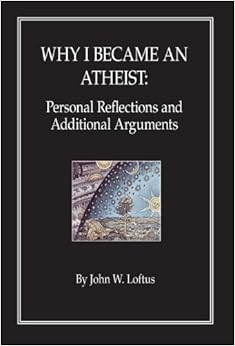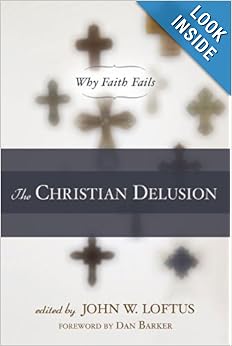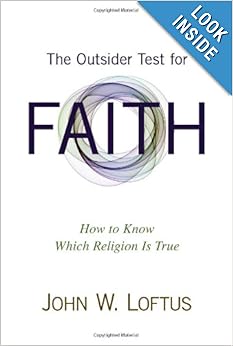It’s no secret that I am a big fan of John Loftus’ books. He has written some corkers. In fact, his class Why I Became an Atheist (or WIBA) is exactly that, a classic. It remains one of the best counter-apologetics books out there and was hugely significant in contributing to my movement toward being so interested in the philosophy of religion.
Let me go through them one by one.
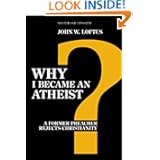 Why I Became an Atheist really is a good book. It comprehensively covers most of the arguments one can find to debunk Christianity, from within the Bible itself, to outside of the Bible in the world of philosophy of religion. There is good treatment of all of the arguments, pulling on various sources of expertise, not least John’s own knowledge. Loftus, being an ex-preacher, is in the perfect position to be able to know theistic arguments and to anticipate apologist maneuvers. The description reads as follows:
Why I Became an Atheist really is a good book. It comprehensively covers most of the arguments one can find to debunk Christianity, from within the Bible itself, to outside of the Bible in the world of philosophy of religion. There is good treatment of all of the arguments, pulling on various sources of expertise, not least John’s own knowledge. Loftus, being an ex-preacher, is in the perfect position to be able to know theistic arguments and to anticipate apologist maneuvers. The description reads as follows:
For about two decades John W. Loftus was a devout evangelical Christian, an ordained minister of the Church of Christ, and an ardent apologist for Christianity. With three degrees-in philosophy, theology, and philosophy of religion-he was adept at using rational argumentation to defend the faith. But over the years, doubts about the credibility of key Christian tenets began to creep into his thinking. By the late 1990s he experienced a full-blown crisis of faith. In this honest appraisal of his journey from believer to atheist, the author carefully explains the experiences and the reasoning process that led him to reject religious belief. The original edition of this book was published in 2006 and reissued in 2008. Since that time, Loftus has received a good deal of critical feedback from Christians and skeptics alike. In this revised and expanded edition, the author addresses criticisms of the original, adds new argumentation and references, and refines his presentation. For every issue he succinctly summarizes the various points of view and provides references for further reading. In conclusion, he describes the implications of life without belief in God, some liberating, some sobering. This frank critique of Christian belief from a former insider will interest freethinkers as well as anyone with doubts about the claims of religion.
The book is now on its second edition. Loftus next produced a short set of blog posts, self-published, which act as a useful ancillary to his main book.
With his first book gaining the popularity and reviews it justly deserved, John started attracting some top-notch interest from big skeptics which allowed him to become editor and major contributor to the first in what will soon become an awesome trilogy: The Christian Delusion: Why Faith Fails. This book is rammed with great contributors and runs at a solid 422 pages, but which does not necessarily need to be read as one. The essays/chapters stand alone, resting on their quality. Together, though, they devastate Christianity. As the description reads:
In this anthology of recent criticisms aimed at the reasonableness of Christian belief, a former evangelical minister and apologist, author of the critically acclaimed Why I Became an Atheist, has assembled fifteen outstanding articles by leading skeptics, expanding on themes introduced in his first book. Central is a defense of his “outsider test of faith,” arguing that believers should test their faith with the same skeptical standards they use to evaluate the other faiths they reject, as if they were outsiders. Experts in medicine, psychology, and anthropology join Loftus to show why, when this test is applied to Christianity, it becomes very difficult to rationally defend. The book then demonstrates errors and superstitions throughout the Bible, exposes the immorality of the biblical God, and focuses on why it is unreasonable to believe that Jesus is the risen son of God. Finally, three popular Christian claims are dispatched. The contributors show why Christianity does not provide the basis for morality, atheism was not the reason Hitler murdered so many, and Christianity was not responsible for modern science. Collectively, these articles reveal that popular Christian beliefs tend to rely on ignorance of the facts. Drawing together experts in diverse fields, including Hector Avalos, Richard Carrier, David Eller, and Robert Price, this book deals a powerful blow against Christian faith.
The chapter list goes:
- Foreword (Dan Barker)
- Introduction (John Loftus)
- Part 1: Why Faith Fails
- 1. The Cultures of Christianities (Dr. David Eller)
- 2. Christian Belief Through the Lens of Cognitive Science (Dr. Valerie Tarico)
- 3. The Malleability of the Human Mind (Dr. Jason Long)
- 4. The Outsider Test for Faith Revisited (John Loftus)
- Part 2: Why The Bible is Not God’s Word
- 5. The Cosmology of the Bible (Edward Babinski)
- 6. The Bible and Modern Scholarship (Paul Tobin)
- 7. What We’ve Got Here is a Failure to Communicate (John Loftus)
- Part 3: Why The Christian God is Not Perfectly Good
- 8. Yahweh is a Moral Monster (Dr. Hector Avalos)
- 9. The Darwinian Problem of Evil (John Loftus)P
- art 4: Why Jesus is Not the Risen Son of God
- 10. Jesus: Myth and Method (Dr. Robert Price)
- 11. Why the Resurrection is Unbelievable (Dr. Richard Carrier)
- 12. At Best Jesus Was a Failed Apocalyptic Prophet (John Loftus)
- Part 5: Why Society Does not Depend on Christian Faith
- 13. Christianity Does Not Provide the Basis for Morality (Dr. David Eller)
- 14. Atheism Was Not the Cause of the Holocaust (Dr. Hector Avalos)
- 15. Christianity Was Not Responsible for Modern Science (Dr. Richard Carrier)
Next was another anthology of works called The End of Christianity which continued where the last book left off, filling in the remaining gaps in the cumulative case against the Judeo-Christian understanding of, and belief in, God. As the description reads:
In this successor to his critically acclaimed anthology, The Christian Delusion: Why Faith Fails, a former minister and now leading atheist spokesperson has assembled a stellar group of respected scholars to continue the critique of Christianity begun in the first volume. Contributors include Victor Stenger, Robert Price, Hector Avalos, Richard Carrier, Keith Parsons, David Eller, and Taner Edis. Loftus is also the author of the best-selling Why I Became an Atheist: A Former Preacher Rejects Christianity. Taken together, the Loftus trilogy poses formidable challenges to claims for the rationality of the Christian faith. Anyone with an interest in the philosophy of religion will find this compilation to be intellectually stimulating and deeply thought provoking.
The chapters run as follows:
- Introduction
- I. Why 2000 Years is Enough
- 1. Christianity Evolving: On the Origin of Christian Species, by Dr. David Eller
- 2. Christianity’s Success Was Not Incredible, by Dr. Richard Carrier
- 3. Christianity is Wildly Improbable, by John W. Loftus
- II. Putting an Ancient Myth to Rest
- 4. Why Biblical Studies Must End, by Dr. Hector Avalos
- 5. Can God Exist if Yahweh Doesn’t?, by Dr. Jaco Geicke
- 6. God’s Emotions: Why the Biblical God is Hopelessly Human, by Dr. Valerie Tarico
- III. Living on Borrowed Time
- 7. The Absurdity of the Atonement, by Dr. Ken Pulliam
- 8. The Salem Witch Trials and the Evidence for the Resurrection, by Dr. Matt McCormick
- 9. Explaining the Resurrection Without Recourse to Miracle, by Dr. Robert Price
- 10. Hell: Christianity’s Most Damnable Doctrine, by Dr. Keith Parsons
- IV. Science Puts An End to Christianity
- 11. Is Religion Compatible with Science?, Dr. David Eller
- 12. Neither Life nor the Universe Appear Intelligently Designed, by Dr. Richard Carrier
- 13. Life After Death: A Scientist Looks at the Evidence, by Dr. Victor Stenger
- 14. Moral Facts Naturally Exist (and Science Could Find Them), by Dr. Richard Carrier
I very much look forward to the final piece in this trilogy, a book to which I myself am contributing a chapter. The book is title Christianity is Not Great.
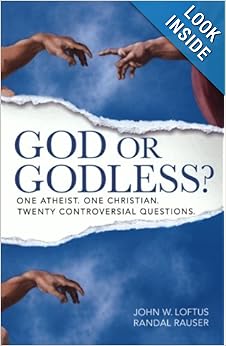 John’s next book was a debate book with apologist Randal Rauser, with whom I have had a radio debate on the subject of the nativity. The book is called God or Godless? and is a short, punchy books, concisely arguing for and against a number of theistic and atheist positions.
John’s next book was a debate book with apologist Randal Rauser, with whom I have had a radio debate on the subject of the nativity. The book is called God or Godless? and is a short, punchy books, concisely arguing for and against a number of theistic and atheist positions.
Perhaps the most persistent question in human history is whether or not there is a God. Intelligent people on both sides of the issue have argued, sometimes with deep rancor and bitterness, for generations. The issue can’t be decided by another apologetics book, but the conversation can continue and help each side understand the perspectives of the other.
In this unique book, atheist John Loftus and theist Randal Rauser engage in twenty short debates that consider Christianity, the existence of God, and unbelief from a variety of angles. Each concise debate centers on a proposition to be resolved, with either John or Randal arguing in the affirmative and the opponent the negative, and can be read in short bits or big bites. This is the perfect book for Christians and their atheist or agnostic friends to read together, and encourages honest, open, and candid debate on the most important issues of life and faith.
I reviewed the book here (I was sent a review copy) and critiqued some of Randal Rauser’s points here and here and here.
The latest book from John, which came out around the same time as God or Godless?, details the argument for which John Loftus has become known. He successfully, really successfully, spelled out his argument in The Outsider Test for Faith: How to Know Which Faith Is True. I loved this book and thought it was superb, synthesising so much good work by others into his own watertight analysis and argument. The description:
At a time when the vast diversity of human belief systems is accessible to all, the outsider test for faith offers a rational means for fostering mutual understanding. Depending on how one defines religion, there are at least thousands of religions in the world. Given such religious diversity, how can any one religion claim to know the truth? Nothing proposed so far has helped us settle which of these religions, if any, are true-until now. This former minister turned atheist thinks we would all be better off if we viewed any religion-including our own-from the informed skepticism of an outsider, a nonbeliever. For this reason he has devised “the outsider test for faith.” He describes it as a variation on the Golden Rule: “Do unto your own faith what you do to other faiths.” Essentially, this means applying the same skepticism to our own beliefs as we do to the beliefs of other faiths. Loftus notes that research from psychology, anthropology, sociology, and neuroscience goes a long way toward explaining why the human race has produced so many belief systems, why religion is culturally dependent, and how religion evolved in the first place. It’s important that people understand these findings to escape the dangerous delusion that any one religion represents the only truth.
All in all, some great books which should be required reading for any skeptic and Christian alike. Great ideas for Christmas gifts!

